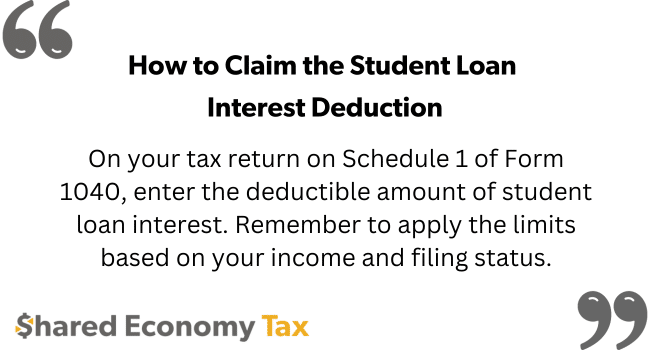
Though student loan forgiveness has been in the news a lot lately, most borrowers are still shouldering significant debt. Though higher education can be a costly investment, there are some benefits to having loans when it comes to taxes. We’ll take a look at the student loan interest deduction and other student loan tax tips.
Student Loan Tax Tips: The Basics
Looking at your student loan balance may be overwhelming, but understanding how interest affects that balance is key to getting out from under your loans.
When you take out a loan, the loan will either come with fixed or variable interest. Fixed interest will stay the same throughout the life of your loan, while variable interest can change according to the terms of your loan.
If you are on an income-based repayment plan, your payment may be less than the interest that accrues each month. In this scenario, your balance may increase over time.
But it’s not all bad news: the interest you pay on your loan may lead to an above-the-line deduction at tax time.
Eligibility Criteria for Student Loan Interest Deduction
You must have taken out the loan to pay for higher education expenses to qualify as student loan interest. Also, the loan cannot be from a related party (i.e., you can’t borrow money from your parents and then claim the interest you pay on the loan.)
The deduction for student loan interest on your tax return is limited to $2,500 each year. Note that this limit applies to your return, so if you’re married and filing jointly, the deduction is still limited to $2,500.
Note that married couples who file separately cannot claim the student loan interest deduction.
The student loan interest deduction starts to phase out as your income increases. The deduction begins to phase out at $140,000 for married couples filing jointly or $70,000 for other eligible filing status.
How to Claim the Student Loan Interest Deduction
Claiming the student loan interest deduction involves a few steps:
- Determine the amount of interest you’ve paid over the tax year. Your lender will typically send you a Form 1098-E stating the interest amount.
- On your tax return on Schedule 1 of Form 1040, enter the deductible amount of student loan interest. Remember to apply the limits based on your income and filing status.
- Ensure you have all required documentation, including Form 1098-E and records of additional interest payments, if any.

Additional Tax Credits for Students
Along with the interest deduction, students can also benefit from the American Opportunity Credit and the Lifetime Learning Credit.
These credits can reduce the amount of tax owed on a dollar-for-dollar basis. While the American Opportunity Credit is limited to the first four years of higher education, the Lifetime Learning Credit is available for all post-secondary education years and courses to acquire or improve job skills.
The American Opportunity Tax Credit is only available for full-time students enrolled in a degree-seeking program. You can only claim the credit for the first four years of undergraduate education.
You can claim the Lifetime Learning Credit for an unlimited number of years, and there is no full-time enrollment requirement.
These credits can work alongside interest deductions, offering students multiple ways to achieve tax savings. The credits are available to whomever claims the student on their tax return, even if the student or other family members pay for the tuition.
Tuition and Fees Deduction
From 2018-2020, a tuition and fees deduction was for taxpayers with higher education expenses. Starting in tax year 2021, this deduction was no longer an option.
The deduction reduced the amount of income subject to tax by up to $4,000. It was available for individuals who have paid tuition and other related expenses for themselves, their spouse, or a dependent. The deduction generally benefited high-income taxpayers since they exceeded the income limits for other educational tax credits.
Tax Benefits for Parents
Parents aren’t left out of the tax-saving equation. They can claim tax credits and deductions for their dependents.
If a parent is responsible for repaying a student loan, they can claim the student loan interest deduction. Additionally, parents can benefit from the American Opportunity Credit and the Lifetime Learning Credit if they claim the student as a dependent on their tax return.
Common Mistakes to Avoid with Student Loan Tax Tips
Because there can be significant tax savings from the student loan interest deduction, it’s important to be careful to avoid these common pitfalls.
Pitfall #1: Forgetting to claim the credit. When it comes to tax time, you should receive a 1098-T from your lender showing the amount of interest you have paid for the year. Make sure that you include this information on your return.
Pitfall #2: Ignoring the income limitations. Remember that the student loan interest deduction starts to phase out when your income reaches $70,000 for single or head of household filers and $140,000 for married filing jointly couples.
Pitfall #3: Attempting to claim interest that you are not personally liable for. Suppose your child is responsible for the repayment of the loans. In that case, the student loan interest will be under their name and social security number, and you will not be eligible for the deduction even if you make the payments on the loan.
Pitfall #4: Trying to claim the deduction while still dependent. You cannot take the deduction if your parents or someone else claim you as a dependant.
Pitfall #5: Missing other education tax credits. If you are still in school, consider the American Opportunity Tax Credit or Lifetime Learning Credit if you are eligible.
Closing Thoughts on Student Loan Tax Tips
Student loan taxes, while complex, offer multiple options for borrowers and their families to reduce their tax burden. The key takeaways for student loan tax tips are understanding the available deductions and credits, ensuring eligibility, and maintaining proper documentation. However, given the intricacies of tax laws, it’s always advisable to consult a tax professional for personalized advice tailored to individual circumstances.